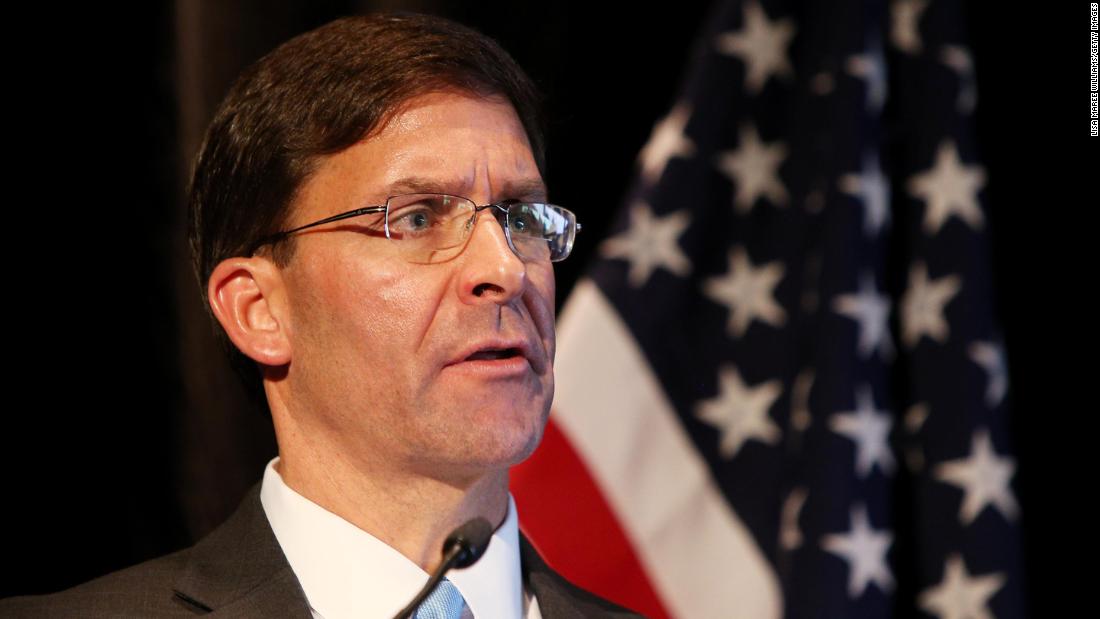
"We will follow the laws of armed conflict," Esper told CNN Monday.
When pressed if that meant not targeting Iranian cultural sites, Esper replied, "That's the laws of armed conflict."
The comments come one day after Trump reiterated his threat to target Iranian cultural sites in a conversation with reporters aboard Air Force One.
"They're allowed to kill our people, they're allowed to torture and maim our people, they're allowed to use roadside bombs and blow up our people, and we're not allowed to touch their cultural sites? It doesn't work that way," Trump said, according to a pool report.
The threats have been met with criticism because it is against international law to target cultural rather than military sites, and the US military's policy has long been to avoid striking areas of cultural importance.
Two senior US officials told CNN Sunday there was widespread opposition within the administration to targeting cultural sites in Iran should the United States launch retaliatory strikes against Tehran.
"Nothing rallies people like the deliberate destruction of beloved cultural sites. Whether ISIS's destruction of religious monuments or the burning of the Leuven Library in WWI, history shows targeting locations giving civilization meaning is not only immoral but self-defeating," one of the officials told CNN.
"The Persian people hold a deeply influential and beautiful history of poetry, logic, art and science. Iran's leaders do not live up to that history. But America would be better served by leaders who embrace Persian culture, not threaten to destroy it," they added.
"Consistent with laws and norms of armed conflict, we would respect Iranian culture," the second senior US official said.
Secretary of State Mike Pompeo, however, defended Trump on Sunday, arguing on CNN's "State of the Union" that such an action would not violate international law and instead suggested it would be a continuation of the administration's attempt at deterrence and defense.
"If we need to defend American interests, we will do so," he told Tapper.
In a separate interview on Fox News on Sunday, Pompeo claimed Trump never said he would order attacks on cultural sites if they struck Americans or American assets, something Trump did tweet on Saturday.
"As for these critiques, President Trump didn't say he'd go after a cultural site. Read what he said very closely. We've made clear that the cost, if they use proxy-forces in the region, will not just be borne just by those proxies. They'll be borne by Iran and its leadership itself," Pompeo said.
Saudi Deputy Defense Minister Khalid bin Salman tweeted Monday that he met with Pompeo to discuss events in the region and "efforts to maintain regional and international peace and stability."
Pentagon defends Iran intelligence
Amid the discourse over targeting Iranian cultural sites, the Pentagon's top leadership defended the intelligence that drove the US military to carry out the strike that killed Soleimani and denied reports that it was "thin," stressing that very few people in government have seen it.
"We know his history. Importantly we knew his future. I'm not going to go into the details of that and I know that a lot of people are out there -- I've seen words like oh the intelligence is razor thin. Very, very few people saw that intelligence. He and I saw that intelligence," Gen. Mark Milley, the chairman of the Joint Chiefs of Staff, told reporters at the Pentagon while speaking alongside Esper.
Trump on Sunday wouldn't rule out releasing some of the intelligence that led to the US killing Soleimani as questions swirl over the timing and legality of the strike.
"I will be happy when the appropriate time comes and in front of the proper committees and anybody else, through history and every -- I will stand by the intelligence I saw, that it was compelling, it was imminent, and it was very, very clear in scale, scope," Milley said Monday.
"Did it exactly say who, what, when, where? No, but he was planning, coordinating and synchronizing significant combat operations against US military forces in the region and it was imminent," he said, adding that "we would have been culpably negligent to the American people had we not made the decision we made."
Esper also defended the strike due to the threat posed by Soleimani, adding that reports that the Pentagon did not believe Trump would select the Soleimani strike option as part of the US operation against Iranian proxies were incorrect.
"We didn't put any option on the table that we didn't believe in and that we couldn't execute, and with each option we present the pros and cons, the costs and benefits. That's what we do all the time. That's my duty, my obligation, that's his (Milley's) duty and obligation as well," Esper said.
"The blood is on his (Soleimani's) hands. He was planning attacks on American forces. He was there on the ground with the leader of Khatib Hezbollah -- met him on the ground at the airplane, welcomed him so they could further coordinate attacks," he added.
Milley also asserted that the US military had anticipated the consequences of the operation, including a suspension of the military's efforts to combat ISIS in Iraq and Syria.
"When we looked at this operation, we knew there would be consequences. We knew there'd be risks. We knew that ahead of time. We didn't take any of it lightly. And the forces, (the commander of the US-led military coalition Lt. Gen. Pat) White and those that work for him in theater, and the CENTCOM theater, we knew we would have to adjust their posture, force protection posture in the immediate aftermath of this particular strike operation," he said.
This story has been updated with additional information from Monday's briefing.
Bagikan Berita Ini














0 Response to "Esper contradicts Trump on targeting Iranian cultural sites: We 'follow the laws of armed conflict'"
Post a Comment